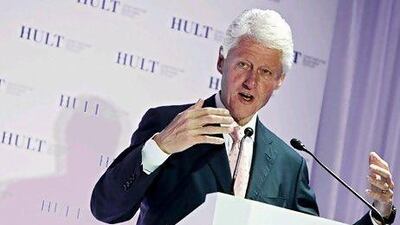Thousands of students competing in this year's Hult Global Case Challenge were given one task - to help a charity called SolarAid deliver off-grid solar power and light to 1 million households by the end of next year.
Here is an overview of what was developed by New York University in Abu Dhabi, which fielded one of the winning teams.
Months ago, the team, of which I am a member, thought it had developed a sound business model. Then members of our team were fortunate enough to conduct on-the-ground research during a trip to East Africa - and our model was turned on its head. The reality on the ground is different, and it is constantly changing, which is why our model has had to evolve.
Our research found commonalities in the settlement patterns of African countries, which becomes crucial in proving the replicability of our model throughout Kenya as well as pilot programmes in Tanzania and Uganda.
Residents tend to live in cities, towns with marketplaces and more-rural towns. Our target customers reside in these rural towns, which are the most receptive to solar products, as they are off-grid and are neither too poor nor too remote to access - unlike small villages.
Three key hurdles to illuminating 1 million households with solar lamps include the high initial cost of the products involved, the lack of awareness about them and logistics issues with supply and distribution.
But our visit to rural towns unearthed an even bigger obstacle.
It turns out the tipping point for many residents in deciding whether to buy a solar product hinges on an assurance of the longevity of their investment through trust and creating the right sense of security.
Historically, solar distributors have focused most if not all of their attention on creating sales stores.
We take the opposite approach.
We aim to create a sales presence, but more important, an after-sales support hub close to our customers. These support centres would be in the marketplaces, where they act as strategic nodes between SolarAid and our customers because the marketplace is where the asphalt road ends - and where SolarAid can reach it efficiently.
At the same time, the marketplace is also where residents of rural towns are already congregating, on average twice a week on set days for buying and selling goods.
Our research shows the greatest sales can be achieved by focusing on SolarAid's mid to upper-range products, known as solar home systems. These products stand out compared with smaller lights because they can charge mobile phones, provide a longer product lifespan and offer the highest profit margins.
More important, sales data shows a shift in favour of these products because customers want them.
Pushing these US$50 (Dh183) to $100 solar products in a relatively poor population becomes possible by partnering with technology providers, such as Eight19, that enable customers to spread their product costs over time through pay-as-you-go devices. These intelligent control boxes work in a similar way to how customers top up mobile phones through the purchase of scratch cards at retail shops: if they stop topping it up, it stops working.
While customers make a small deposit of $10 to $20 up front, they pay as little as $5 in monthly instalments via the pay-as-you-go method, which is less than their monthly expenditure on lighting kerosene lamps and charging mobile phones. After 12 to 18 months, they own the product outright.
Pairing these pay-as-you-go devices with more mature solar-product suppliers that have local warehousing in Africa and mass-manufacturing capabilities could help to increase sales. We also propose sending a specialised sales team to targeted rural towns, with the objective of establishing relations with key community partners such as schools.
During a "seeding week", for instance, local customers would be made aware of the various components of our enterprise and produce high initial sales.
Longer-term sales would be sustained by harnessing the skills of existing electronics and hardware mechanics working in marketplaces. These men are popularly known in Kenya as "fundis".
We would offer incentives for these fundis to provide our after-sales support, which would include diagnosis and repairs, warranty fixes and advising customers about common user mistakes.
They would be given training and be our eyes and ears for consumer feedback that would help to redesign our solar products in the long term.
The team that developed this model from New York University in Abu Dhabi included Madhav Vaidyanathan, Songyishu Yang, Muhammad Awais Islam, Ruey-Ting (Gary) Chien and Neil Parmar
twitter: Follow and share our breaking business news. Follow us

